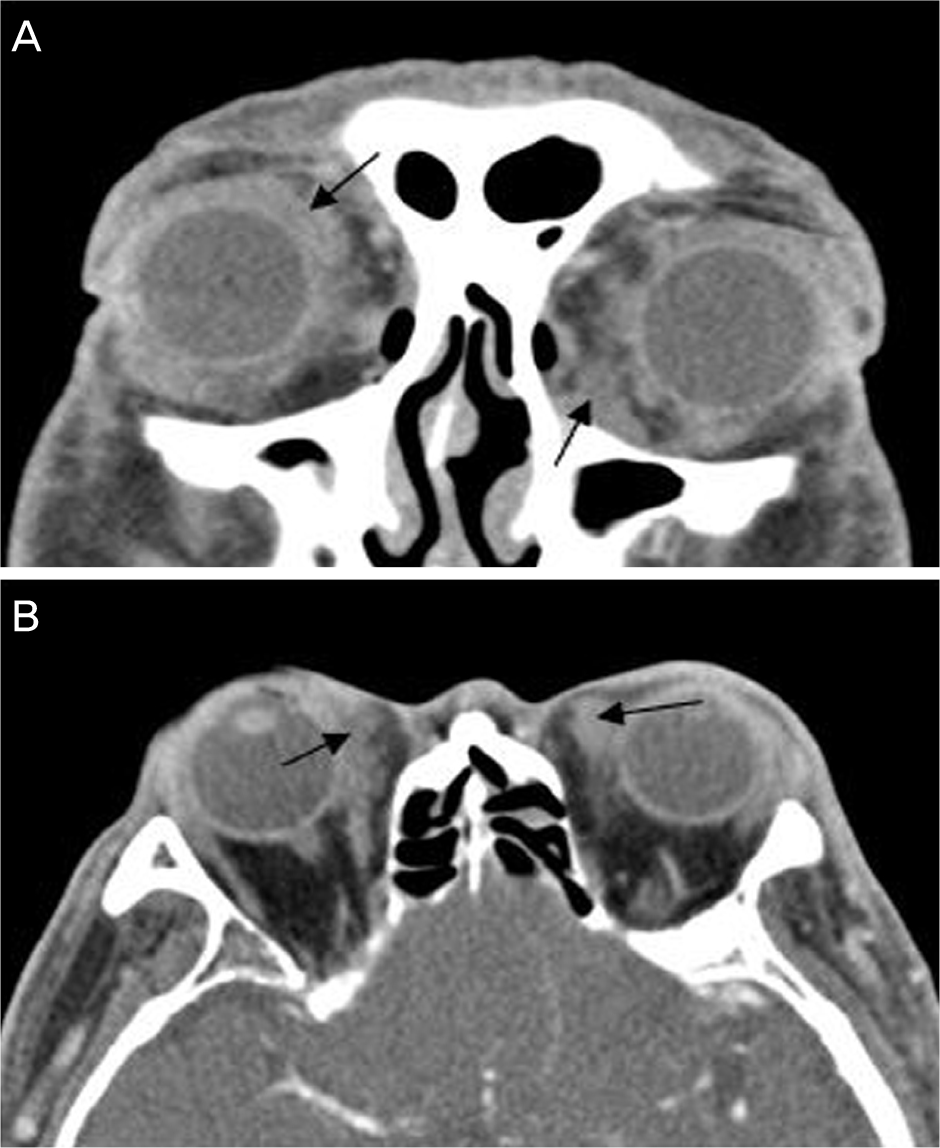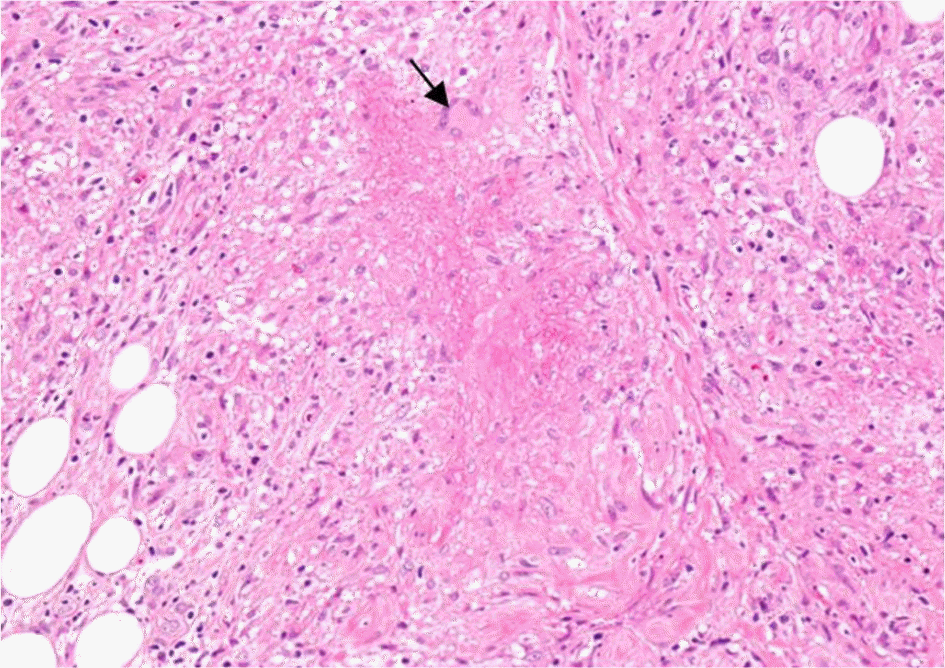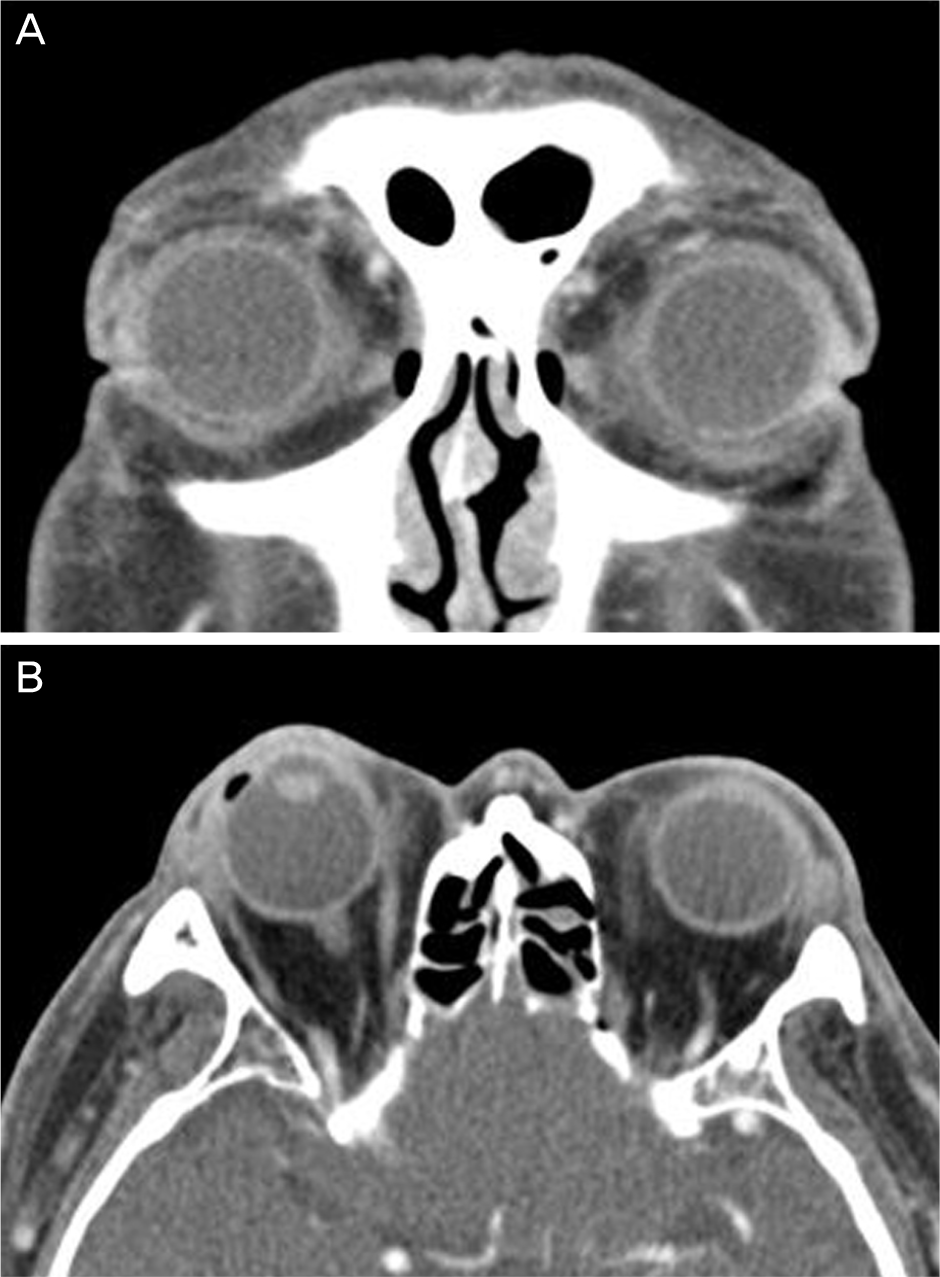Abstract
Purpose
Periocular tuberculosis is common in the form of conjunctival tuberculosis or uveitis; however, orbital tuberculosis is very rare. We report a case of tuberculosis diagnosed based on bilateral orbital masses.
Case summary
A 64-year-old male with a history of diabetes, hypertension, and chronic obstructive pulmonary disease presented with diplopia. His best-corrected visual acuity was 1.0, and intraocular pressure was 16 mmHg in both eyes. Bilateral proptosis was noted, and inferior orbital masses were palpated in both eyes. On orbital computed tomography, irregular masses were surrounding both globes in the extraconal space. Incisional biopsy of the bilateral orbital masses was performed under local anesthesia. Pathologic examination revealed chronic granulomatous inflammation accompanied by caseous necrosis. The patient was diagnosed with bilateral orbital tuberculosis and underwent triple therapy with isoniazid, rifampin, and ethambutol for 12 months. The orbital masses completely resolved, and there was no recurrence or complication through 12 months after treatment.
References
1. Ahn JH, Lee CY, Lew HM, Park KH. A case of tuberculosis of lid. J Korean Ophthalmol Soc. 1996; 37:1293–7.
3. Agrawal PK, Nath J, Jain BS. Orbital involvement in tuberculosis. Indian J Ophthalmol. 1977; 25:12–6.
4. Madge SN, Prabhakaran VC, Shome D, et al. Orbital tuberculosis: a review of the literature. Orbit. 2008; 27:267–77.

5. Mohammad AENA, Al-Hussaini MK, Karoosh SS, et al. Tuberculosis of the orbit and lacrimal gland. Orbit. 1992; 11:199–204.

6. Sen DK. Tuberculosis of the orbit and lacrimal gland: a clinical study of 14 cases. J Pediatr Ophthalmol Strabismus. 1980; 17:232–8.

7. Sivaraju L, Saritha A, Atal A, Hegde AS. Fronto-orbital tuberculous osteomyelitis with temporalis myositis. Orbit. 2016; 35:161–2.

8. Dalvin LA, Smith WM. Orbital and external ocular manifestations of Mycobacterium tuberculosis: A review of the literature. J Clin Tuberc Other Mycobact Dis. 2016; 4:50–7.

9. Choi HY, Choung HK. Korean Society of Ophthalmic Plastic & Reconstructive Surgery. Kim SD, editor. eds.Ophthalmic Plastic and Reconstructive Surgery. 3rd ed.Goyang: Naewae Haksool;2015. ;chap. 19.
10. Pillai S, Malone TJ, Abad JC. Orbital tuberculosis. Ophthal Plast Reconstr Surg. 1995; 11:27–31.

11. Narula MK, Chaudhary V, Baruah D, et al. Pictorial essay: Orbital tuberculosis. Indian J Radiol Imaging. 2010; 20:6–10.

12. Sharma A, Pandey SK, Mohan K, et al. Tuberculosis of the lacrimal gland: a case report. J Pediatr Ophthalmol Strabismus. 1998; 35:237–9.

13. MacFaul PA, Duke-Elder SS. System of Ophthalmology, Vol. 13: The Ocular Adnea: Part 2: Lacrimal, Orbital and Para-Orbital Diseases. London: Henry Kimpton;1974. 902–5.
14. Dewan T, Sangal K, Premsagar IC, Vashishth S. Orbital tuberculoma extending into the cranium. Ophthalmologica. 2006; 220:137–9.

15. Tuli N. Orbital tuberculosis in childhood with intracranial extension: a case report. Cases J. 2010; 3:38.

16. World Health Organization (WHO). 2015 Global Tuberculosis Report. 20th ed.WHO;Oct 2015. ;Annex 4 Key TB indicator:. p. 157–92.
17. Hong YP, Kim SJ, Lew WJ, et al. The seventh nationwide tuberculosis prevalence survey in Korea, 1995. Int J Tuberc Lung Dis. 1998; 2:27–36.
18. Banait S, Jain J, Parihar PH, Karwassara V. Orbital tuberculosis manifesting as proptosis in an immunocompromised host. Indian J Sex Transm Dis. 2012; 33:128–30.

19. Park TK, Kim IS, Yoon BB. A study on Tuberculin in an Urban Primary School. Korean J Prev Med. 1973; 6:119–32.
20. Kaur A, Agrawal A. Orbital tuberculosis-an interesting case report. Int Ophthalmol. 2005; 26:107–9.
21. Patkar S, Singhania BK, Agrawal A. Intraorbital extraocular tuberculosis: a report of three cases. Surg Neurol. 1994; 42:320–1.

22. Tay E, Gibson A, Chaudhary N, Olver J. Idiopathic orbital inflammation with extensive intra-and extracranial extension presenting as 6th nerve palsy–A case report and literature review. Orbit. 2008; 27:458–61.
23. Sheu SJ, Shyu JS, Chen LM, et al. Ocular manifestations of tuberculosis. Ophthalmology. 2001; 108:1580–5.

24. Litvinov AV, Ariél' BM. Historical reference: giant multinuclear cells in tubercular granuloma. Probl Tuberk Bolezn Legk. 2005; 11:59–61.
Figure 1.
Initial contrast enhanced orbital computed tomography scan. Ill-defined irregular masses (arrows) were noted in both orbits. The masses were located in extraconal space and surrounding the eyeball (A, Coronal view; B, Axial view).





 PDF
PDF ePub
ePub Citation
Citation Print
Print




 XML Download
XML Download